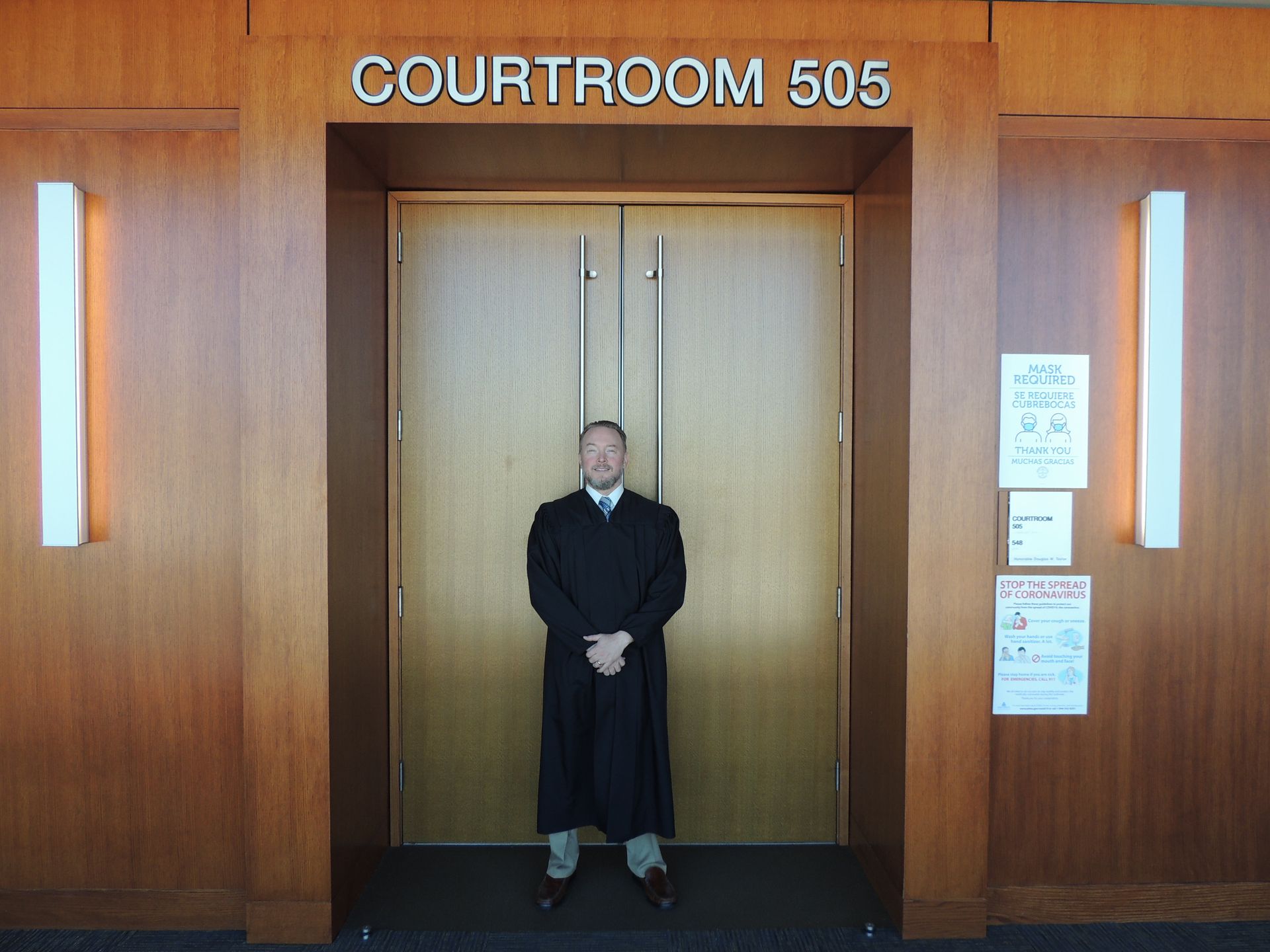
Fact-Checked
This page has been written, edited, and reviewed by a team of legal writers following our comprehensive editorial guidelines. This page was approved by Founding Partner, Matthew Cohen who has years of legal experience as a criminal defense attorney. Our last modified date shows when this page was last reviewed.
A practical playbook for Orders of Protection & Injunctions Against Harassment in Tucson and Pima County

A Former Pima County Judge Explains Orders of Protection & Injunctions Against Harassment
If you’ve been served with an Order of Protection or Injunction Against Harassment (some call them “restraining orders”) in Tucson, you’re probably staring at those papers thinking:
- Am I going to be arrested if I go home?
- Can I see my kids?
- Can I carry or own firearms?
- What happens at this hearing?
- Will I get fired?
- Am I going to jail?
Here’s the truth from someone who has sat and stood on both sides of the judicial bench in Pima County:
An Order of Protection isn’t “just paperwork.” It’s a court order with real consequences. But it’s also something you can fight — if you do it the right way.
This guide walks you through what these orders mean in Tucson, how hearings work, and how to prepare so a judge actually hears your side.
Order of Protection vs. Injunction Against Harassment (Tucson Edition)
Arizona has two main tools people use when they ask the court for protection:
1. Order of Protection (OOP)
Used when there’s a qualifying domestic relationship (current/former spouse, romantic partner, family member, etc.). Common in domestic violence situations.
An OOP can:
- Prohibit contact (in any form)
- Require you to stay away from a home, job, or school
- Affect your gun rights
- Make you go to DV classes
- Include other conditions tailored to safety concerns
2. Injunction Against Harassment (IAH)
Used when there isn’t that domestic relationship, where the main issue is ongoing harassment, threats, or stalking-type behavior.
An IAH can:
- Limit contact and proximity
- Address neighbors, co-workers, ex-friends, etc.
Both can be issued quickly — almost always without you even present — and both can be enforced by arrest and serious criminal charges if you violate them.
If you’re searching “Order of Protection Tucson” or “Injunction Against Harassment Tucson,” you’re already ahead of many people who just crumple the papers and hope it goes away.
Step One: Read the Papers (Yes, Really)
Before you do anything else:
Read every line. Look for:
- What contact is prohibited and what might be permitted
- Addresses/locations you must avoid
- Who you cannot contact (can be more than 1 person)
- Any firearm/weapon language
- Hearing date and court (Tucson City Court, Pima County Consolidated Justice Court, Pima County Superior Court, etc.)
Assume they mean what they say.
“No contact” usually means
no calls, texts, DMs, comments, gifts, or messages through friends/family, or social media posts.
If you’re confused, do not guess.
Violations are often more dangerous than what triggered the order.
Step Two: Decide Whether to Request a Hearing
In all cases, you have the right to request one hearing to challenge the Order of Protection or Injunction Against Harassment.
Reasons people in Tucson ask for a hearing:
- The order has you kicked out of your home.
- You can’t see your children under the current terms.
- The allegations are exaggerated, incomplete, or false.
- The order is impacting your job, professional license, or firearm rights.
Reasons to think carefully:
- A hearing is on the record.
- Poorly handled testimony can hurt you in related criminal, family, or DV cases.
Bottom line: A hearing is often worth it — but only if you’re prepared.
What Actually Happens at an OOP/IAH Hearing in Tucson
Every judge has their own style, but the structure is similar across Tucson City Court, Pima County Justice Court, and Pima County Superior Court.
Expect:
- The judge calls the case, and verifies who is present.
- All witnesses are sworn upon their oaths to tell the truth.
- The petitioner (the person asking for protection) may testify first, call witnesses, and offer exhibits.
- The defendant can cross-examine the petitioner, present his/her own testimony, call witnesses, and offer exhibits.
- The petitioner has the burden of proof: Preponderance of the Evidence.
- After hearing from everyone, the judge can decide to:
- Keep the order as is
- Modify it
- Quash (dismiss) it
Hearings can be short. This is where most people lose: they wander, argue, or bring nothing organized.
As a
former judge, here’s how
I
saw it from the
bench:
The person who respects the process, comes prepared, has valid points, seems honest, and gets to the point has a
huge advantage over the person who shows up angry, confused, and empty-handed.
How to Prepare: A Tucson OOP/IAH Hearing Checklist
Use this as your printable prep list. It’s built for Pima County courts.
1. Timeline
Write a simple, dated timeline:
- Key events leading up to the request
- Any incidents mentioned in the petition
- What actually happened (briefly)
- What has happened since the order
Keep it:
- Honest
- Chronological
- Short
- To the point
2. Evidence (Exhibits)
Common helpful exhibits
- Text messages / emails
- Call logs
- Social media messages or posts
- Photos / videos
- Police reports (if they help, or to contextualize)
- Work schedules / travel records
- Prior messages showing the true pattern (harassment both ways, consent, etc.)
Label them:
- Exhibit A, B, C… if you are the defendant
- Exhibit 1, 2, 3…if you are the petitioner/victim
- With a one-line description
The judge shouldn’t have to try to solve a complex puzzle on the fly.
3. Witnesses
You don’t need a cast of thousands.
Pick 1–3 witnesses, if any, who:
- Actually saw or heard key incidents, or
- Can reliably confirm where you were / what was said
Prepare them to answer directly. Judges tune out rehearsed speeches.
4. Your Testimony
Focus on:
- Safety and compliance: show you understand and follow court orders
- Clarifying false or missing facts
- Why certain conditions are unfair or unworkable (housing, kids, job) — and what reasonable alternative you’re asking for
Avoid:
- Name-calling
- Rudeness
- Wild accusations
- “Let me tell you our entire relationship history”
You will not have time for a therapy session. Get right to what the judge legally has to decide.
What Judges Care About (More Than You Think)
From the bench side, I paid attention to:
- Is there an actual, recent risk of harm, harassment, or stalking?
- Has there been police involvement? Prior orders?
- Is the defendant taking the order seriously? (Compliance matters.)
- Is the requested protection reasonable?
I did not reward:
- Eye rolling
- Side comments
- Social media rants printed out as “proof” with no context
- People using the order as a weapon in side disputes like chid custody or divorce
If you want to challenge an Order of Protection in Tucson successfully, your job is to make it easy for the judge to see the full, accurate picture and to trust that reasonable boundaries will be followed.
Five Ways People Accidentally Lose OOP/IAH Hearings
- They violate the order before the hearing.
Even one text like “we need to talk” can sink you. - They show up with zero documents.
The other side hands over neat exhibits; you shrug and say “that’s not true.” Guess who’s more persuasive. - They turn it into a shouting match.
Judges don’t reward chaos. - They over-share.
Bringing in unrelated, damaging facts (or admissions) can hurt criminal or family law matters. - They don’t ask for a specific outcome.
Tell the judge exactly what you’re seeking:
- Quash the order
- Modify certain locations
- Restore limited contact for children/arrangements
Do You Need a Tucson Protective Order Lawyer?
You’re allowed to represent yourself. Plenty of people do.
You should seriously consider a Tucson protective order lawyer / injunction attorney if:
- You share children or a home with the petitioner
- There is a related criminal case (especially domestic violence)
- Your job, license, or firearm rights are on the line
- The allegations are detailed, ugly, or strategic (e.g., mid-divorce)
- You feel you’ll lose your temper or freeze under pressure
- You feel confused about the process
- You clam up under pressure
A good local protective order attorney will:
- Explain what your specific court cares about
- Organize your timeline and exhibits
- Prep you (and witnesses) to testify clearly
- Push for reasonable modifications or quash where appropriate
- Protect you from saying things that burn you later
If You’re the Petitioner (Seeking Protection)
This isn’t just about defense.
If you’re legitimately afraid and searching “Order of Protection Tucson” because you need safety:
- Be truthful and specific about recent incidents
- Bring evidence and witnesses if possible
- Explain why you need each piece of the order (home, work, school, kids)
- Don’t exaggerate; credibility wins
Victim rights include being heard, updated, and protected. A lawyer experienced in both sides of these cases can help you navigate that without turning your life into a longer war.
One-Page Hearing Prep (Summary)
Before your Tucson OOP/IAH hearing:
- Read the order carefully.
- Don’t violate it.
- Decide your goal: quash, keep, or modify.
- Build a timeline.
- Gather and label Exhibits 1–5 (max, unless truly necessary).
- Pick 1–3 solid witnesses, if any.
- Practice a 2–3 minute statement that hits only what the judge needs to rule on.
- Show up early, dressed respectfully, and follow courtroom rules.
- Follow your lawyer’s advice closely
If at any point you’re unsure, talk to someone who has sat in those rooms, knows those judges, and understands how these orders interact with criminal and family cases.
About the Author
Douglas W. Taylor, Sr. is a Tucson criminal defense attorney and former Pima County Judge with nearly 25 years of courtroom experience. He represents clients on both sides of Orders of Protection and Injunctions Against Harassment in Tucson City Court, Pima County Justice Court, and Pima County Superior Court, (and throughout Southern Arizona) with a focus on safety, stability, and long-term outcomes.
Tucson, Arizona, Law, Domestic Violence, Order of Protection, Injunction Against Harassment, Courts, Legal Advice

